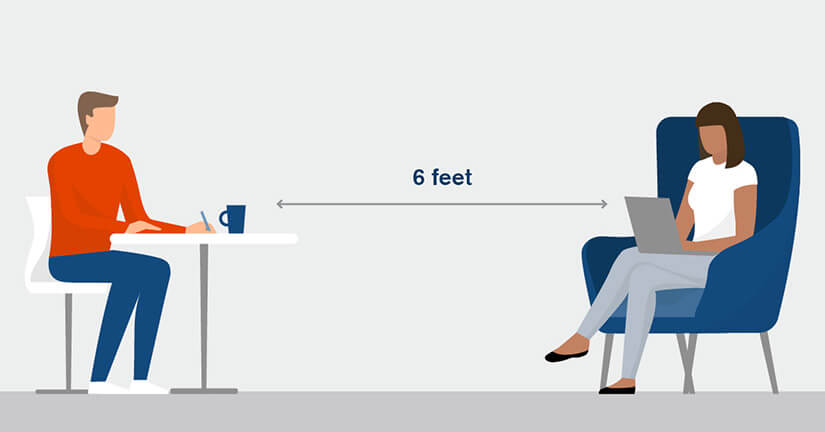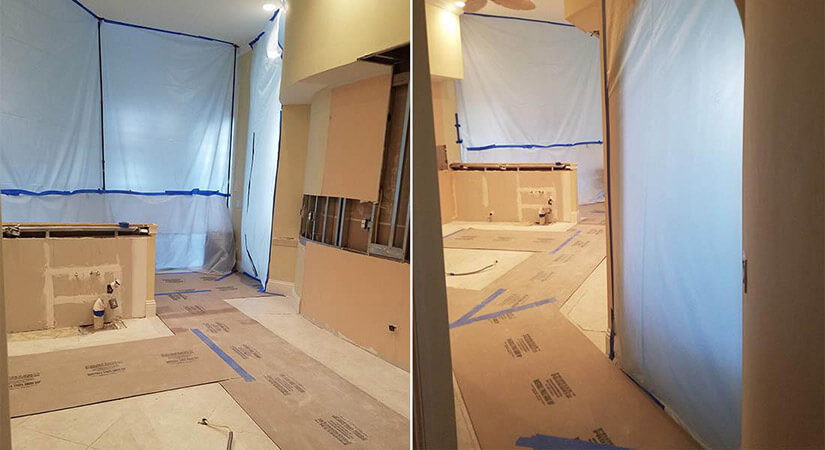kitchen remodeling
How To Work With Home Contractors And Maintain Social Distancing

Depending on your state’s laws and injunctions surrounding COVID-19, contractors may still be working. Many people are postponing interior renovations, but sometimes the show must go on. Let’s talk about guidelines and best practices for maintaining social distancing while working with home contractors.
Plans Are Fluid
Always keep an open mind and be prepared for your contractor to cancel even if they are allowed to work. Also, be aware that they may want the work but might also be nervous about working in your home.
Working in an unoccupied structure is one thing. Employees can keep their distance from each other, in most situations, and they don’t have to worry about the virus passing to or from a family member in the house.
But when you have a contractor coming to work a project in your house, they have to deal with more risk. Companies are limiting the number of workers allowed at one time in an effort to keep everyone safe.
According to a recent survey by the Associated General Contractors of America, 28% of contractors said current and upcoming projects have been delayed.
Some delays are initiated by the contractors in response to the virus. Others noted that their suppliers are delivering materials behind schedule, as well. Many contractors also said they can’t find government workers to issue permits or conduct inspections.
There are many moving parts to a home remodel, so don’t be surprised if plans fall through even if your contractor is up for the job.
Construction Industry Safety Coalition Response Plan

In light of COVID-19, the Construction Industry Safety Coalition (CISC) has published a Coronavirus Preparedness and Response Plan for Construction. This plan lays out best practices for construction companies to follow, whether working on an uninhabited building or an occupied home.
Guidelines include:
- Workers should sanitize work areas upon arrival, throughout the workday, and right before leaving
- Contractors and employees should ask occupants to keep a minimum distance of six feet at all times
- Workers should wash hands before and after the job
- In-person meetings should be limited
- Workers shouldn’t share tools
You should expect any contractor to abide by these rules when they enter your home.
Before The Job
If a contractor is coming over, be sure to clean and disinfect the area where they will work. They should be using proper protective gear like gloves and masks. But you and your family should also wear masks while they are inside or avoid the room where the contractor is working. Remember, the contractor doesn’t know if your family has been exposed to COVID-19, so you want to make the situation as safe for them as possible.
Check with the contractor to see if they take online payments. You don’t want to pass cash or cards back and forth after the job. Also, check to see if they have digital versions of forms that clients usually sign in person. Passing a clipboard and a pen back and forth isn’t a good idea right now.
If you don’t have a non-shared bathroom available in your home, ask the contractor to rent a portable toilet for workers. Many companies are already doing this even when a non-shared restroom is available. Non-shared bathrooms could include a guest, mudroom, or garage bathroom.
During The Job

While the workers are at your home, the name of the game is social distancing. If you have to talk about a specific fixture or area of your home, wear a mask and maintain at least six feet of space. You can let the contractor walk ahead into a room while you stay in the doorway, for example.
It’s better to raise your voice across a few yards than stand right next to a non-family member. Don’t feel weird about talking on your phone with a contractor in your own home, either. You can use phones like walkie-talkies even when workers are on the premises. Expect to conduct any meetings via video chat before or after the contractor is at your home, as well.
Many companies are also isolating work rooms with plastic and tape to minimize contact. You may have seen this before for jobs that generate dust, but contractors can use this for any type of job right now.
After The Job
Workers should be disinfecting work areas at the end of each day, but you can do another cleaning after that, too. When the job is finished, avoid paying with cash or handing over a physical card. If you have to use a debit or credit card, disinfect it immediately and wash your hands after that.
Conclusion
In your state, contractors may only be allowed to keep building new structures and not remodeling projects. Even so, you might need to invite a worker into your home to fix an HVAC system or a plumbing issue. You can use these tips to stay safe during those situations, as well.
![See your dream kitchen in 3D [GET YOUR FREE DESIGN]](https://cdn.kitchencabinetkings.com/blog/wp-content/uploads/see-your-dream-kitchen-in-3d.webp)
![Contractor Discount Program: Offering contractors and builders special volume discounts on all applicable orders [LEARN MORE]](https://cdn.kitchencabinetkings.com/blog/wp-content/uploads/contractor-discount-program.webp)
![Explore our photo gallery [GET INSPIRED]](https://cdn.kitchencabinetkings.com/blog/wp-content/uploads/explore-our-photo-gallery.webp)
![What everyone is saying about KCK [READ REVIEWS]](https://cdn.kitchencabinetkings.com/blog/wp-content/uploads/what-everyone-is-saying-about-kck.webp)
![Get a cabinet sample [SHOP SAMPLES]](https://cdn.kitchencabinetkings.com/blog/wp-content/uploads/get-a-cabinet-sample.webp)
![Pay over time, on your terms with Affirm [LEARN MORE]](https://cdn.kitchencabinetkings.com/blog/wp-content/uploads/pay-over-time-on-your-terms-with-affirm.webp)
Maintaining social distancing can be very challenging and I’m glad after reading your blog that you really care to people. After this covid19 crisis, I will look for a home contractor that will help us do the home remodeling. It’s been a while since my partner together with our kids to enhance the beauty of our house but I don’t have time to look for a reliable contractor due to work. Hopefully, this crisis will be solved as soon as possible so we can travel to look for our properties.